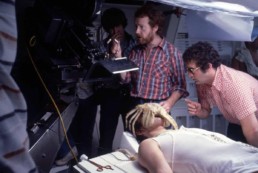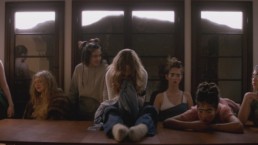Comedian Tim Heidecker Runs For Office in Mockumentary 'Mister America'
MISTER AMERICA (2019)
Starring Tim Heidecker, Gregg Turkington, Terri Parks
Directed by Eric Notarnicola
Written by Tim Heidecker, Gregg Turkington, Eric Notarnicola
Distributed by Magnolia Pictures. 86 minutes. Opens in select theatres on Wednesday, October 9th at Alamo Drafthouse Downtown LA.
After the election of 2016, it’s impossible to imagine that another brash, egotistical TV personality could get elected to public office. Enter Tim Heidecker – yes, the actor and character have the same name – as he runs for District Attorney of San Bernardino, CA in the mock-documentary Mister America. It may seem that the purpose of this mockumentary is to answer the question, “Will this guy actually win?” but director Eric Notarnicola shows us how far actor, writer, and character Tim Heidecker will go to make himself, and politicians like his character, the punchline.
The character of "Tim Heidecker" comes from his podcast turned Adult Swim show On Cinema at the Cinema where Heidecker and Gregg Turkington co-host a local cable access movie review series. In the show, Heidecker is truly unaware of film and movies and gives meaningless critiques with the gusto and certainty of a Roger Ebert. This character is continued into Mister America as filmmaker Josh Lorton (Eric Notarnicola) follows Heidecker’s campaign to become District Attorney against the incumbent Vincent Rosetti (Don Pecchia). The motive for Heidecker’s sudden call to politics follows his trial where he was accused of killing 18 people during his Electric Sun Festival from malfunctioning vapes. As you may have guessed, Vincent Rosetti was the D.A. for the case. After Heidecker was found not guilty, he began his smear campaign against Rosetti calling him a “Rat” and threatening to run himself. Heidecker claims he is the best lawyer because he represented himself, got a mistrial, and took down the “Rat.” Even though this is a mockumentary, the name-calling and arrogance by those seeking political power feel all too familiar to our actual reality.
The parallels between Heidecker’s fictional character and real politicians are eerie, but a fascinating deep dive into how our political system works as a whole. Heidecker, Turkington, and Notarnicola do an expert job in picking apart what candidates must do during an election and expose the current themes of our elections since 2016. Most notable is Heidecker’s consist sound bite “Strong on crime, against corruption,” along with his promise to have a 100% reduction in crime. Not once does a potential voter, his campaign manager, nor filmmaker Josh Lorton ask him what his plan is, or how he’ll make this a reality. Rather, the brash and outlandish statement garners no critical thinking from any party. One of the more comical bits comes from the political signs that Heidecker takes to hang in restaurants with his slogan “We have a rat problem” in bold, large print. Only one place does not give him permission and it's hilarious to see how many others allow it, again, just blindly accepting because of his boisterous personality.
Mister America can be summed up best by Judge Edward Szymczyk’s (Curtis Webster) short and accurate description Tim Heidecker: “Style over substance.” We are left thinking how outrageous Heidecker is and called to reflect on current elections and the sideshows they have become.
'Memory: The Origins of Alien' Review: The Chestburster Scene and More
Alien captivated audiences by creating new nightmares beyond the typical jump cut and scare, forever changing the standards of the sci-fi genre. On the 40th anniversary of the film’s release, documentarian Alexandre O. Philippe takes this chance to dive deeply into the origins of Ridley Scott’s breakthrough sci-fi classic and the iconic “Chestburster” scene in Memory: The Origins of Alien. With the same attention to detail that Philippe used in 78/52 (dissecting the shower sequence in Alfred Hitchcock’s Psycho), lovers of Alien, sci-fi, and filmmaking get to explore the inspiration, genius, and creativity that made Alien a centerpiece of suspense and horror that, arguably, remains unsurpassed.
While Philippe shows how many minds and creatives came together to create the film, the one person without whom there would be no Alien was the late Dan O’Bannon. His lifelong fascination with comics, the sci-fi genre, and horror fiction inspired many of the beloved aspects and scenes. In one interview, it was shared that O’Bannon would joke that he didn’t steal from anyone, he stole from everyone. For example, the famous “Chestburster” scene has so many points of origin that it’s hard to truly trace the lineage, but it’s fun to see how every part helped to make the iconic scene. The 1951 DC comic Seeds of Jupiter was one part of O’Bannon’s inspiration, along with his obsession with H.P. Lovecraft’s Necronomicon, and even O’Bannon’s diagnosis of Crohn's disease which his widow said, “was devouring him from the inside.”
With the same attention to detail that Philippe used in 78/52 (dissecting the shower sequence in Alfred Hitchcock’s 'Psycho'), lovers of 'Alien,' sci-fi, and filmmaking get to explore the inspiration, genius, and creativity that made 'Alien' a centerpiece of suspense and horror that, arguably, remains unsurpassed.
The most impressive thing that Philippe does is acknowledge how Alien pushed boundaries in female equality, and how corporations missed this but audiences throughout the years haven’t. His first treatment, which was titled Star Beast before garnering the name we know today, had both interspecies rape and male pregnancy. And not one male producer even noticed. This begins to address the guilt patriarchal society felt in 1979 and are still uncomfortable talking about in 2019. Ripley is an amazingly captivating, fully realized, and dynamic role for a woman, which was originally written for a man. “It’s wonderful how the subconscious works,” an interviewee notes.
Alien has shaped how sci-fi and horror films can push and challenge its audience. One interviewee paraphrased how Lovecraft defined his style of horror fiction as ‘weird fiction’ saying that, “the essence of horror is the unknown. And what is most unknown, it is what is out there in the depths of space...” Memory: The Origins of Alien does just that: it gives us the essence of horror by breaking down how the unknown came together, and celebrating all sci-fi art that came before it. This is a delight for those who are avid Alien fans and lovers of sci-fi and should be embraced by those who want to continue to change the film industry, and our world, for the better no matter what the medium they use may be.
'Ladyworld' is a Thrilling Female-Adaptation of Lord of the Flies
LADYWORLD (2019)
Starring Ariela Barer, Annalise Basso, Ryan Simpkins, Odessa Adlon, Maya Hawke, and Tatsumi Romano
Directed by Amanda Kramer
Written by Amanda Kramer and Benjamin Shearn
Distributed by Cleopatra Entertainment. 93 minutes. Opens Friday, August 2nd at Arena Cinelounge Hollywood and VOD release Tuesday, August 27th.
We see nothing but black accompanied by the sounds of rumbling, shattering, and screaming: this is how we are introduced to the unsettling, unnerving state that is Ladyworld. What starts as a birthday party is quickly derailed as an earthquake hits and takes the majority of the house underground, trapping the eight girls inside with no idea of when, or if, they’ll be rescued. This all-female adaptation of Lord of the Flies, directed masterfully by Amanda Kramer, takes the novel’s powerful themes about the corruption of power and the human struggle between civilization and savagery and applies them to teenage girls giving a new perspective on the all-male novel.
The struggle for power between the girls is punctuated in-between moments of dread and unease. Each character is given many opportunities for reflection as they continue to fall into a paranoid state of mind and lose their false pretenses; growing into the beasts that lay dormant inside them. Like the “beast” in Lord of the Flies, the girls believe they are fearful of a strange man who is trapped in the house with them, but find it’s what they have developed into that they should fear.
Olivia (Ariela Barer) and Piper (Annalise Basso) show the polar oppositions during this event as the former struggles to maintain order and civility, while the latter quickly slips into savagery and uses a mob-mentality to garner followers. Both actors give strong performances and have the audience wondering how this group became friends.
Ladyworld uses the female perspective from its writers and director to capture feminine relationships and the intricacies within them. One of my favorite moments between Barer and Basso is when they are discussing why girls never really like one another. Piper has been told by her mother that it’s because girls are too competitive with one another and Olivia responds in disbelief saying, “Who? You and your mom?” Olivia then shares that her step-father told her it’s because girls just want a boy’s approval. I appreciate the way the writers highlight the many people in women’s lives who try to impress upon them what women need to value while continuing the negative rivalry between our gender and our own selves. The film does excellent work exploring how women react to morality and immorality through the harsh reality they live in, and how they struggle to remain friends.
There are many instances where Ladyworld expertly captures the tension of being trapped with no end in sight with the uncomfortable realness of female friendships being put to the test. Every actor gives a performance that plays with the dread of their situation and the rising tension as the factions grow and their true selves start to take over. It works because the viewer never feels safe. Ladyworld challenges its audience as it shows the true horror that can come when individuals want to feel in control, and when chaos is the only way to maintain that control.
https://www.youtube.com/watch?v=j5GEC67JHTk
Interest Turns Into Deadly Obsession in 'A Dark Place'
A DARK PLACE (2019)
Starring Andrew Scott, Denise Gough, Catherine Dyer
Directed by Simon Fellows
Distributed by Shout! Factory. 89 minutes. Not Rated.
Originally titled Steel Country when it made its way through the festival circuit, A Dark Place is the story of Donny (Andrew Scott), a sanitation worker, who becomes interested in the mysterious death of a young boy. After learning that police deemed his death an accidental drowning, Donny is determined to solve it. After a conversation with the boy’s mother where she makes a remark about how her son wouldn’t wander off alone, Donny is certain there was foul play involved.
Director Simon Fellows brings out the curiosity in each character and reminds us of what can happen to our mindset if we never explore the world around us. Cinematographer Marcel Zyskind does an expert job of bringing the small town in Ohio to life through his dark and atmospheric shots that show the deep and seedy underbelly of decay. He finds visually beautiful and striking imagery to establish the small, mid-American town we’re all familiar with. This collaboration makes the setting a living, breathing character throughout the film and one that adds dimension to the entire plot.
The film has moments where character-driven motivation is hard to find and leads to missed opportunities to educate its audience about prejudice when it comes to disability. Andrew Scott plays Donny as a man who is socially awkward, consistently missing social cues and jokes, which is never addressed nor discussed in the film. He may be someone that falls somewhere on the autism spectrum but seems to be high-functioning, because of the situations he is put into. From missing a joke and taking it at its literal meaning to becoming extremely fixated on solving the young boy’s murder, we see the same behaviors displayed throughout the media of humans with disabilities. These unanswered questions could lead to an audience questioning the characters mental health and detract from the actual storytelling. Due to his behavior not meeting society’s norms of how someone "should behave," Donny quickly becomes the main focus and suspect. This is a trope that many, many films have used and a fresher take would have been to cast an actor on the autism spectrum to give the viewer a true account and lens to see the character of Donny through. Scott is brilliant in his portrayal and keeps Donny grounded, real, and developed but with so many actors of varying backgrounds, identities, and life experience, I am left wondering how the story would have changed and grown with different casting.
The marriage between the unsettling tone of the movie and its small-town setting makes A Dark Place a masterpiece in how symbolism and subtly are a delicate art form. Simon Fellows and Marcel Zyskind do this well when showing how the town is rotting from the inside out. Flies continually buzz around Donny as he goes from house to house collecting trash. Not only is the garbage rotting but the small town itself is too as it turns a blind eye to find the killer. From the opening, it is quickly revealed that this film has something to say about the state of power in today’s America. Clean cut lawns with Trump/Pence signs along with closed down gas stations and warehouses that hang banners of the Presidential ticket as well let us know we are modern times. This is the America that felt underrepresented and ignored by the Obama administration. Where people lie and men abuse power to keep their power. Something that can be found not only in the fictitious town from the film but in many, many pockets of America today.
A Dark Place has so many points of view it wants to explore and messages it wants to deliver, but the lack of focus and clarity in the writing makes the film fall flat. While there are many great parts that can stand alone, the complete film isn’t truly a thriller. The resolution of the mystery and who killed the young boy is underwhelming and does not feel like the payoff the viewer deserves. Unfortunately, it reaches for tragic irony but doesn't quite make it due to inconsistencies and underdeveloped plot.
A Dark Place opens today at Arena Cinelounge Sunset and available on Amazon Prime Video.
'Unlovable' Review: Not Your Typical Manic Pixie Dream Girl
Unlovable is the type of independent comedy that executive producers Mark and Jay Duplass are best known for; quirky, relatable characters and a storyline with a heart of gold.
Director Suzi Yoonessi gives us much to admire in this film as she tackles difficult issues of addiction and recovery with playfulness, and co-writer/star Charlene deGuzman gives us a relatable protagonist who destroys the Manic Pixie Dream Girl that indie films consistently rely on.
The film begins with Joy (deGuzman) trying to kill herself by drinking a bottle of cough syrup from a DIY bedazzled glass, and we quickly recognize that she is deeply unhappy with her life yet unable to help herself as she has no knowledge of how to cultivate her own happiness. She is a love and sex addict who lashes out when she does not feel loved by her boyfriend, Ben (Paul James), by binge drinking and indulging in random hook-ups. After cheating on Ben, he dumps her and tells her to “get help.” Joy begins a 12-step program where she meets Maddie (Melissa Leo) and is in awe of her progress and journey. After getting denied to be Maddie's sponsee and getting ignored by Ben, her life quickly spirals towards rock bottom. She wakes up the next day to a harsh reality, finding that she was the main sexual attraction at a bachelor party (which she doesn’t remember), has lost her job on a children’s TV show after another missed called time, and is being kicked out of her apartment all within the same day.
The alluring charm of Unlovable is how it packages dark topics into a disarmingly light presentation. Written by Charlene deGuzman, Mark Duplass, and Sarah Adina Smith, the film is loosely based on deGuzman’s real-life experience in a 12-step program for sex and love addiction. The stakes of Joy’s troubles are plain to see and quite raw in deGuzman’s performance, which can be attributed to her closeness to the material. Rather than needing someone to fix her, which is a classic trope in romantic comedies, deGuzman lays bare her deeply troubled, desperately dependent soul as she struggles to take back her life. Even better is that deGuzman brilliantly pulls this off, yet remains amusing even when it’s obvious that she’s attempting to provoke members of her audience with the material.
Ultimately, Maddie recognizes Joy's pain and offers to be her sponsor. Maddie gives her temporary living arrangements in the guesthouse behind the home of her grandmother (Ellen Greer) as Joy tries to accomplish 30 days of sobriety. Maddie gives Joy two rules while living in the guesthouse: 1) She must go 30 days without alcohol or sexual activity, and 2) she can't interact with her brother Jim (John Hawkes), an emotionally aloof yet vulnerable musician who serves as their grandmother’s caregiver.
Rather than needing someone to fix her, which is a classic trope in romantic comedies, deGuzman lays bare her deeply troubled, desperately needy soul as she struggles to take back her life.
Throughout the film, Joy and Jim cultivate a healing friendship through their love for music. It would have been easy to let the film become one where they become lovers, or she becomes his muse, and by devoting herself to his needs he betters himself and she finds that being with him “cures” her. Thankfully, this movie is so much better than that, their relationship does not take the "only-a man-can-save-her route." Rather, Unlovable focuses on how Joy continuously tries to reinvent herself to varying levels of success and failure. Each blunder on her road to recovery is either hilarious or heartbreaking, but deGuzman’s performance illuminates how recovery is actually a combination of both.
The development of their friendship is the establishment of a mutual support system, something both of these broken souls desperately need. Hawkes, who wrote all of the film's original songs, delivers a masterful give-and-take with deGuzman as they build their friendship. Both push each other to become better and find that music is their common language and lifeline. In one instance, Joy is feeling hopeless and sadden by her struggle in recovery, and before they are going to perform a song Jim asks what's bothering her. Rather than answering, she strikes the drum set and captioning appears on the bottom of the screen. Jim replies by playing his guitar and his response then appears. They have their entire conversation in music, and then they begin to play their song. deGuzman and Hawkes expertly show us how friendship can save us during the darkest moments. Yoonessi’s direction is strong at this moment and gives us the gift of seeing how, even when we are in the deepest depths of our struggle, we can find someone who will listen, be there, and support us.
Unlovable is a fresh spin on the classic recovery narrative, and deGuzman’s voice adds honesty and sincerity that sets it far apart from others in the same vein. Joy’s choices are more often than not heartbreaking, but the film recognizes that easy fixes aren’t possible nor sustainable. I appreciate that Unlovable gives us a woman who is realistically flawed whom we root for in the midst of her self-destructive tendencies. You will enjoy the tender nature of Joy and Jim’s friendship and will cheer for both on their journey of self-discovery as they battle the demons they want to defeat once and for all.
80 minutes. ‘Unlovable’ is not yet rated. Opened Friday, November 2nd at Arena Cinelounge Sunset and available on Amazon Prime Video.
'306 Hollywood' Review: Love, Loss, and Grandma's Treasures
Elan and Jonathan Bogarin’s 306 Hollywood feels like a heartful trip down memory lane, and while that may not appeal to all movie-goers, it is one of the most relatable films you are likely to see all year.
It is a personal narrative that found many ways to express itself because the subject of the film, the Bogarin’s late grandmother, Annette Ontell, had numerous ways that she expressed herself! This story may seem small and have one ask themselves, “Why this story?”, but it will touch anyone who has ever lost a loved one, which makes it a universally appealing story, and quite large indeed.
After Annette Ontell’s death in 2011, Elan and Jonathan returned to the house where they spent many Sundays loving their grandma, 306 Hollywood Avenue in New Jersey. It looks like your average suburban house, painted white with a nice size front lawn and located in a quiet neighborhood. They viewed the house as her entire world since they only ever saw her there, and know that she was a former dress designer. As they begin to dive into the years worth of accumulated memories and mementos, our filmmakers realize that this house is a shrine, a monument, a ruin, and even a time machine to the woman that was their larger-than-life grandmother. They began to uncover the many layers about the woman they loved and are transported to how she lived before they were born.
After speaking with Sherry Anthony, a funeral director, our filmmakers learn that a soul will stay in the place that person loved most. They give themselves 11 months, the time a soul will stay put before moving into the next plain, to make their grandma tangible again in the house she, and they, loved. We are given many interviews with leading experts about their theories and ideas about what happens to someone we loved once they die, and how we, the living, are to process the death. I asked myself, “Don’t I try to find meaning when someone I love dies? Don’t I try to bring them back so the pain isn’t as strong?” This desire to reconnect with the part of us who died is something far more universal than most realize. Like our filmmakers, we search and scour for evidence that our loved one isn’t really, truly gone. Through every hand-made dress, homemade video, and molded tax book, we see our filmmakers experiencing grief as they try to find their grandmother in the house that they associate with her, and fail to bring her back. Which reminds us that we don’t really know what happens after death but we hope that our loved ones are someplace wonderful.
'306 Hollywood' does not have a star-studded cast, nor a plot that leaves audiences guessing at every turn, but it does something far more spectacular and meaningful. It reminds us that loss and grief are universal.
One of the most poignant interviews comes from the director of the Rockefeller Archive as he explains the importance of preserving records of the famous and powerful, but the equal importance of his own family's archive of treasures. This is something that runs throughout 306 Hollywood, the notation that value is weighted by those closest to the person, and that it can be found equally in things big and small. We see the Bogarins find value in big things, like the 10 years worth of interviews that they conducted with their grandma, and the small things, an extremely expired can of gefilte fish.
My favorite part of the time machine flashbacks were the interviews Elan conducted once a year from 2001-2011. These were like miniature studies in the nature of memory and revisionist history as we see how she edits the footage to showcase the woman she loves and memorialize the impact Annette had on Elan’s life. Over-the-top zooms and post-production music laid over seem to take away from the beauty of this found footage, except in one very raw and emotional moment. We witness Elan and her mother convince her grandma into wearing the dresses she made fifty years ago. She protests and laments about how she was ninety-five pounds, there is no way the dresses will fit on her, and that she’s wearing her sneakers while trying on these dresses. Elan’s mom finds her favorite dress that Annette made and wore, and is so happy when it does fit on Annette again. They are able to take a “still” of her in that dress from long ago, Annette makes one more comment about having to wear her sneakers while in the beautiful dress, and the moment comes to an end. This footage is emotionally charged and beautiful, as we see a genuine moment unedited. It’s straightforward and honest in how families interact with one another, and perfectly encapsulates the special bond, language, and love we share with our own families.
306 Hollywood does not have a star-studded cast, nor a plot that leaves audiences guessing at every turn, but it does something far more spectacular and meaningful. It reminds us that loss and grief are universal. That when in the midst of it, we search for that loved one wherever we can and are ravenous to know them better. Elan and Jonathan Bogarin have created a beautifully crafted love letter to the woman they considered their second mother. Their groundbreaking documentary turns the ritual of cleaning out their late grandmother’s house into a deep study of what happens to those who are left after a sudden loss. I think that one of the last lines in the documentary echoes the experience the audience goes through with the Bogarins, and even in their own dealings with a loss. “A house is a universe, an entire world. And it’s always amazed me when I go to the sites of houses I know, where the house has been removed. It’s always astonishing and appalling and outrageous that the footprint is so small. It’s like taking all of the stars in the galaxy and putting them in a thimble. To see all of that life put into a few hundred square feet on the ground.”
306 Hollywood is the cathartic movie we need when struggling through loss. Be prepared to fall in love and laugh with the extraordinary woman that was Annette Ontell, and weep as you reminisce about the extraordinary people who have come and gone in your own life.
94 minutes. ‘306 Hollywood’ is not yet rated. Opens Friday, October 12 at Laemmle’s Royal Theatre and Laemmle’s Town Center 5.
'After Everything' Review: The Pain of Accidental Significance
23-year-old Elliot (Jeremy Allen White) is the stereotypical millennial.
Holding a part-time job with no aspirations, he parties every night with his roommate and best friend Nico (DeRon Horton), using the power of allusion to help him get laid. Meanwhile, Mia (Maika Monroe) is a young professional in a job she hates, bored by the monotony of life. So begins directors Hannah Marks and Joey Power’s intelligent romance After Everything, which lets the audience live through Elliot and Mia's tender relationship while showing how disease intensifies love by introducing dependency and high-stake emotional investment in the beginning stages.
After a rather painful one-night stand, Elliot continues to experience a strange pain in his groin, which he assumes is an STD. His doctor finds a tumor on his pelvic bone, biopsies it, and diagnoses Elliot with a rare form of cancer called Ewing’s Sarcoma. Within the same week, he meets Mia while waiting for a subway train, recognizing her as a regular customer at his deli, and asks for her number without blinking. Soon, the two are diving head first into a passionate relationship due to the stakes of Elliot’s prognosis. His illness quickly becomes the glue binding their relationship together, as Mia becomes Elliot’s support system as he undergoes physically and emotionally debilitating chemotherapy treatments. She begins to find purpose, meaning, and a sense of fulfillment as she helps to care for Elliot, depending on him to fill the voids in her life. Elliot is just as guilty as he continues to act on his natural impulsive behavior by proposing to Mia in the park after he learns that the chemo is not working and he will have to undergo surgery, which has a 20% success rate. After the surgery is successful, the couple seems to be happy and enjoying their wedded bliss. Soon after the “honeymoon” stage of their relationship has ended, they realize that they don’t really know each other and what they believed to be deep, true love begins to fall apart.
Marks and Power do an excellent job at observing that in a crisis, people take on accidental significance. Any other time, it wouldn’t mean much if Elliot imagined the cute girl he just met in her underwear. But when this takes place in a sperm bank because the number of chemo rounds he must take may have the side effect of infertility, suddenly it seems as if she is "The One". This launches Elliot into a spiral that only Mia can help him through. They cross off items on his bucket list, which includes a hilarious scene with them taking ecstasy (but Mia makes sure to Google “What happens when you take MDMA and have cancer?”), and only continues to heighten their dependency on one another and perpetuate the misconception that they are destined to be together forever because they went through this together.
Jeremy Allen White and Maika Monroe have the kind of chemistry that filmmakers hope to achieve in romantic comedies, and will have audiences championing this star-crossed pairing.
Jeremy Allen White and Maika Monroe find the pathos and humor in every scene. White gives us a man who is detached due to fear of death rather than just being underdeveloped. White makes Elliot a believable 23-year-old- someone who often doesn’t know what he wants beyond a good time but he knows he’s found something special. Monroe’s Mia is lost and alone in a brand new city and grasps at any connection to make this place her home. She is loving and caring through her scenes with White which are conveyed through her choice of tone and dynamic. We see her strong and forceful, yet there is clear evidence of her motivation: unyielding love and loyalty to the man she loves. We experience her blind devotion to her boyfriend as she pours through endless articles to gain more knowledge, and doesn’t let doctors push her around just because she’s lacking the "Doctor" title. Monroe gives Mia the perfect arc to become the strong, independent woman by the end of the film. White and Monroe have the kind of chemistry that filmmakers hope to achieve in romantic comedies, and will have audiences championing this star-crossed pairing.
After Everything is extremely impressive from start to finish. It taps into universal themes of difficulties sustaining relationships at any age. We see how people can sabotage their future in an instant when the foundation isn’t given enough time to set. The cast gives remarkable performances that add dimension no matter the screen time. The writer/directors expertly craft a story that shows the reality of a fast-paced, high-intensity love and balance that with comedy that adds to the story, not detracts. If you are looking for a film that echoes today’s dating climate, pokes fun at the Millennial/Gen Z dating rituals, and leaves you feeling more whole and alive by the end credits, then you must go see After Everything.
95 minutes. ‘After Everything’ is not yet rated. Opens Friday, October 12th at Vintage Los Feliz Theatre
'A Happening of Monumental Proportions' Review: A Collision of Chaos
In Judy Greer’s directorial debut, A Happening of Monumental Proportions, we are given a star-studded cast of well known and loved actors.
Unfortunately, the film does them no favors as its flat script, written by Gary Lundy in his first feature credit, has tone-deaf, problematic jokes paired with an underdeveloped story arc. Greer does a phenomenal job giving life to dramatic moments by honing in on the real emotion and pushing it forward, but by trying to combine the film's edgy humor with touching, sentimental character development, A Happening of Monumental Proportions ultimately falls flat on both accounts.
Our touchstone throughout the movie is Daniel (Common), a widowed father trying to be the best parent he can for his daughter Patricia (Storm Reid) by remembering to show up to her school’s Career Day. During his morning commute, he is confronted with a phone call from the husband of his assistant, Nadine (Jennifer Garner), with whom he’s been having an affair. He wants to meet for lunch so that he can compare Daniel to himself, and maybe kick his ass. His day continues to spiral when Daniel arrives to work the kitchen is taped off due to someone cutting the cord to the coffee machine, and Daniel finds himself the scapegoat as his ex-lover has wrongfully accused him of the crime. Plus, he gets fired by his new, rigid boss, Mr. Arthur Schneedy (Bradley Whitford).
Chaos continues to follow all the characters in this film. At Patricia’s school, Principal Nickels (Allison Janney) finds the corpse of the school gardener first thing in the morning. With the help of her Vice Principal, Mr. Ned Pendlehorn (Rob Riggle), they carry the body to the teacher’s lounge. The stress from Career Day has them in a frenzy and they just want to hide the body so word does not get out. Christian McRow (Anders Holm), the music teacher, is morose after he lost his chance at a record label and his girlfriend broke up with him once and for all. Our last tortured soul is a new student, Darius (Marcus Eckert), who is constantly plagued with loneliness as he continues to move around due to his father’s job. After being harassed by the school bully, Rufus (Michael Berthold), Darius is shown kindness by Patricia as she helps him up and, cue the sappy love song like the movie does, he has a “meet cute” and falls in love instantaneously. A defeated Daniel shows up in the nick of time for Career Day only to realize that the man who just fired him, Mr. Schneedy, is also a parent in this class. Tempers flare and the two men sling insults at one another during their Career Day presentations, which leads to a literal “let’s take it outside” fist fight which is lackluster, uninspiring, and robbed of potential humor.
Though the part is small, [Kumail] Nanjiani does an excellent job taking the material and finding moments where he can insert more subtle comedy that reads better for the mood of the scene.
Multiple times in the film, jokes do not land and can be quite offensive to the modern day audience member. There is a running gag about Kevin, the corpse, being a Mexican gardener even though he has a name that is perceived as Caucasian. Mr. Pendlehorn cannot comprehend how he could be named Kevin and even slips by saying that it’s, “..not a traditional Mexi-” before receiving eye piercing glares from his scene mates, and the viewers having to witness this travesty. When a teacher calls the company that contracts him to see who he is to inform his family of his passing, they learn there are actually four Kevins, and Mr. Pendlehorn is floored. The insensitivity does not just stop at Pendlehorn, as we see it when we meet Bob (Keanu Reeves), Nadine’s husband. During his confrontation with Daniel, Bob takes him to the bathroom to compare their manhood and gives Daniel an "Indian burn" on his arm. When asked by Daniel if he was just given one, he replies with an unfounded sense of confidence, “Apache-style!” This tone-deaf joke took away from the success of scenes where the humor and heart were just right.
The most amusing scene is with Daniel and the HR employee (Kumail Nanjiani) during his exit interview. Though the part is small, Nanjiani does an excellent job taking the material and finding moments where he can insert more subtle comedy that reads better for the mood of the scene. He becomes a soundboard for Daniel to unload all his worries, troubles, and fears on and Nanjiani does a great job of being an HR employee who cares but wants to follow protocol. While they are saying their goodbyes, the HR employee gives Daniel his card and with a cheesy on purpose, yet genuine smile says, “I may not be a registered therapist, but I am a registered friend.” The dry delivery paired with Nanjiani’s effortless comedic timing made this scene one that stood out amongst the rest.
The most touching scene is between new student Darius and music teacher Christian. They both find their way to the roof of the school after having spent the majority of the day trying to connect with someone and find a place where they can just breathe. Christian is dealing with an existential crisis as he realizes that his dream of being a musician will never be. Darius has found that loneliness plagues his life and that the constant moving and identity of being “The New Kid” means that he can never truly connect with anyone and has no place to call home. We are given exceptional performances by both Holm and Eckert as they show us how two seemingly different men, one a 6th-grade student and the other a music teacher, can be the friend and confidant they had been searching for.
While the cast seems to have had fun working together and enjoyed the process, A Happening of Monumental Proportions has largely surface material that does not make it easy for the viewer to connect with the characters, nor something to buy into so that an emotional investment can occur. The script dips its toe into both comedic and dramatic ponds but never commits to a fully realized concept. The ending echoes this noncommittal tendency as it just fades out without any true resolution for our main characters and unfortunately, leaves the viewer with a feeling of confusion and disappointment.
81 minutes. ‘A Happening of Monumental Proportions’ is rated R for sexual content and language. Opens Friday, September 21st at Laemmle’s Ahrya Fine Arts Theater, Laemmle’s Monica Film Center, and Edwards Westpark 8.








